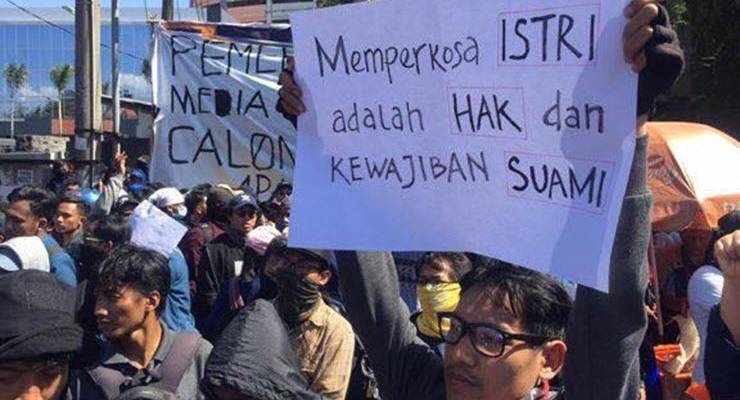
When Indonesian President Joko Widodo was re-elected by a comfortable majority in May, it seemed that he would have several years to step up his program of economic reforms.
Now, weeks out from his October 20 inauguration, the country’s House of Representatives (DPR), also elected in May, has been sworn in amid ongoing street protests by a rejuvenated student cohort. The protests are the biggest seen in the country since those that helped bring down the Suharto regime in 1998.
Two students and another young person were killed in protests at the weekend in the northern province of Sulawesi. The demonstrations are taking their cues from those that have been roiling Hong Kong for more than four months, and highlight fears over Widodo’s commitment to reform.
The marches initially started over a proposed suite of new laws and amendments, including a ban on extramarital sex that could effectively criminalise homosexuality, a ban on abortion except in cases of rape and incest, stronger laws on blasphemy, and laws making it a crime to insult the president and vice-president.
Reformist protesters have demanded the inverse, including laws banning marital rape and prison terms for parents who marry-off underage progeny. They’ve also voiced their concerns over environmental issues, including pro-business mining laws and the ever-present problem of palm oil corporations burning and cutting down virgin rainforest for farmland. Workers’ groups joined the protests in Jakarta on October 2, agitating for better labor conditions.
Then there’s the issue of corruption. Protesters have called for a ban on military and police officers serving in government, and demanded the president revoke a law that restricts the investigative powers of the Corruption Eradication Commission (KPK). Set up in 2002, the KPK has been instrumental in helping Indonesia on the path to democracy post-Suharto. Widodo has been concerned that Islamic purists are “Talibanising” the organisation, although observers say there is little evidence of this. On September 26 he bowed to pressure and said he was considering a regulation that would bypass the new law.
The Australian government reacted quickly to last week’s protests, spooked no doubt by the thought of countless Australian holiday-makers caught up by the new sex laws. But it’s the broader notion of an increasingly conservative Indonesia, and the radical side of Islam that rides along in the shadows, that has never boded well for Australia — either in terms of the micro level of tourism or the macro level of getting along with a neighbour that we will find increasingly difficult to understand.
Similarly, any moves to wind back anti-corruption efforts with further cruel what is already a difficult environment for foreign businesses to navigate, perhaps negating any positive flow-on effects from the recent Indonesia-Australia free trade agreement.
Still, keen observers believe Widodo’s greatest problems lie not with anti-conservative, anti-corruption students, but with the opposition led by the Gerindra Party, which has the third largest number of seats in the DPR, and his own somewhat unwieldly six-party coalition that gives him a nominally comfortable majority.
Since the peak of the protests on September 24 and Widodo’s (yet unfulfilled) promise of action, things have certainly calmed down in terms of the number of people taking to the streets. As well, the make-up of students, or those that may be pretending to be students, has changed. A split has emerged in the student cohort, with conservative students speaking out in favour of the new laws (unsurprising given the strength of Islamist campus groups). Likewise, people on the ground say that other elements — and Indonesia has myriad protest groups — appear to be infiltrating the protests which are atomising as a result.
Whatever the case, the government must remain careful. Students are an important and somewhat hallowed constituency in Indonesia, due to their pivotal role in bringing down Suharto. The longer the protests go on, assuming they continue to fracture, it may be easier for the government to divide and conquer.
Ultimately, this is a reality check for Widodo, who must weigh political expediency with his legacy. Whether he has the political strength to choose his own path remains unclear.








Crikey is committed to hosting lively discussions. Help us keep the conversation useful, interesting and welcoming. We aim to publish comments quickly in the interest of promoting robust conversation, but we’re a small team and we deploy filters to protect against legal risk. Occasionally your comment may be held up while we review, but we’re working as fast as we can to keep the conversation rolling.
The Crikey comment section is members-only content. Please subscribe to leave a comment.
The Crikey comment section is members-only content. Please login to leave a comment.